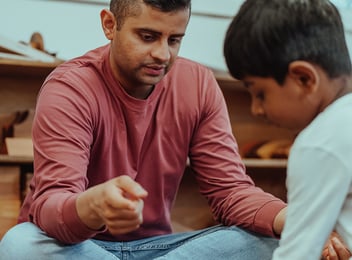“A boy arrived from a war-torn battleground in Ukraine, being exposed to bombings and violence and hiding in bus shelters waiting to leave there. With parent support and guidance from us at kindergarten within this new relationship, I was able to connect services, provide literature and engage many strategies to support this family. Slowly but surely kinder enabled transformation across all developmental areas. This looked like co-regulation, communication and achieving many learning milestones in our community. He has become connected, trusting, and engaged.”
This anecdote from Julie Kavanagh of Melton Central Kindergarten beautifully demonstrates the effect quality learning can have on children and families experiencing vulnerability. We know there are so many more children and families who can benefit from Early Start Kindergarten (ESK) and the increased hours of Pre-Prep. But sometimes families themselves don’t even know they’re eligible, or what ESK or Pre-Prep means.
What is Pre-Prep, and who is eligible?
From 2025, the Victorian Government is transitioning Four-Year-Old Kindergarten to Pre-Prep, doubling weekly funded hours from 15 to 30 by 2036. ECMS is offering 22.5 hours in 2026 for children who are eligible through the same criteria as the Early Start Kindergarten (ESK) program.
So, who qualifies?
Children are eligible if they:
- Identify as Aboriginal or Torres Strait Islander
- Are from a refugee or asylum seeker background
- Have had contact with Child Protection as a family at any point
This includes children born in Australia to parents who arrived as refugees, as well as those currently seeking asylum.
How we can help
Too often, we meet families, especially those from refugee backgrounds, who simply don’t know they’re eligible. There may have been barriers to understanding our systems or they might not feel confident to ask. Some may be reluctant to identify themselves as refugees, either from past trauma or because it’s a term that carries weight and complexity. Some families may not have visa paperwork anymore.
At ECMS our role is to step into conversation in culturally safe and trauma-informed ways.
If a family is from a refugee background, educators can gently explore:
- A family’s journey to Australia (eg travelled from their home country via another country such as Hong Kong, Vietnam, Iran, Iraq, Syria or Myanmar)
- Whether a family’s country of origin has experienced conflict or persecution
- Whether a family has ever held (or applied for) a refugee or asylum seeker visa
If a family or caregiver doesn’t feel safe to disclose this information, we suggest the option of reaching out to their local CALD Outreach Worker within the council or our Family Liaison Officer at ECMS. Any of this information can also include any guardian, not just the guardian completing the form. It’s not about proving anything, it’s about knowing a family might be eligible for a program that gives their child more hours of education at no cost to their family.
Use the calculator
Families can use the Victorian Government Pre-Prep calculator to check what they’re entitled to. It’s a simple tool, available in multiple languages, and it can open doors for families who had no idea support was available.
Supporting children through Pre-Prep
We know that children from refugee backgrounds are more likely to have experienced trauma. This might show up in lots of ways: difficulties with transitions, heightened anxiety, or reluctance to separate from family.
Pre-Prep is more than extra hours; it’s a healing space when it’s done well. With key strategies informed by Foundation House, we want to support families in a number of ways:
- By creating calm, predictable environments with routines families can understand
- By using interpreters as standard practice
- By inviting families to stay during orientation and settling
- By offering visual supports, cultural representation, and quiet spaces
- By celebrating a family’s culture and language through their program
Trauma recovery starts with safety and trust. We build it through relationship and connection. We want families to feel seen and understood and reap the long-term benefits of early childhood education.
Differentiated learning meets families where they are
Just as we adjust our teaching based on a child’s zone of proximal development, we need to consider families in the same way. If a family doesn’t yet feel ready to identify their needs, we plant the seed. We build relationship. We return to the conversation gently, and over time, their trust grows.
It’s not about pushing. It’s about standing alongside.
This is our shared responsibility
As teachers and educators, we’re in a unique position to unlock opportunities for families who might otherwise miss out. ESK and priority access within BSBL reforms take steps toward addressing systemic disadvantage and it is our job to welcome all families, wholeheartedly. We don’t need perfect knowledge of every system. We need the curiosity and care to ask questions, the confidence to refer, and the compassion to follow through.
Every child deserves a strong start.
For many, Pre-Prep is that start, and we can ensure the door is open.



